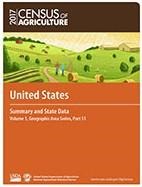The last day to sign up for the 2022 Census of Agriculture is June 30, 2022. If you have never received a census and are new to National Agricultural Statistics Service surveys, sign up to be counted today. You do not need to sign up if you received the 2017 Census of Agriculture or already receive other NASS surveys.

2017 Census of Agriculture
Key Dates for 2022 Census of Agriculture:
- June 30, 2022 – sign up ends
- November 2022 – census mails out
- February 2023 – response deadline
- Spring/summer 2024 – data release
The Census of Agriculture is a complete count of U.S. farms and ranches and the people who operate them. Even small plots of land - whether rural or urban - growing fruit, vegetables or some food animals count if $1,000 or more of such products were raised and sold, or normally would have been sold, during the Census year. This can include hobby farms with livestock, such as chickens or horses, or crops growing in the backyard or on a rooftop. The Census of Agriculture, taken only once every five years, looks at land use and ownership, operator characteristics, production practices, income and expenditures.
The data informs policy and program decisions that directly impact producers, their operations, industries, and communities. A complete count, with every producer getting and taking the opportunity to be represented in this data, is vital. For America’s farmers and ranchers, the Census of Agriculture is their voice, their future, and their opportunity.
On the NASS Ag Census webpage, producers can also access frequently asked questions, explore past and current Ag Census data, access tools to help spread the word about the upcoming Ag Census, learn about Ag Census special studies, and more.
Source : ksu.edu